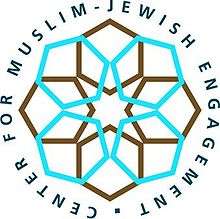Center for Muslim-Jewish Engagement

The Center for Muslim-Jewish Engagement[1] (CMJE) is a faith-based coalition whose stated mission is to "promote dialogue, understanding and grassroots, congregational and academic partnerships among the oldest and the newest of the Abrahamic faiths while generating a contemporary understanding in this understudied area and creating new tools for interfaith communities locally, nationally and beyond."[2]
Mission and history

The Center for Muslim-Jewish Engagement (CMJE) is made possible through help from the Righteous Persons Foundation and the relationship between Hebrew Union College-Jewish Institute of Religion (HUC), the Omar Ibn Al Khattab Foundation and USC's Center for Religion and Civic Culture at the College of Letters, Arts, and Sciences. The foresight of USC President Steven B. Sample and his actions of increasing harmony amongst USC and its neighbors was necessary for CMJE’s inception.[3] The project began with a friendship between Mr. Dafer Dakhil, Dr. Donald Miller, Ms. Brie Loskota, and Reuven Firestone back in 2002. Since 2005, the quartet has been responsible for holding two international conferences, educating visiting Islamic scholars, hosting programs with collegiate scholars, and creating a pathway for USC, HUC and members of Masjid Omar Ibn Al-Khattab to interact.[4] It was officially created in 2008.[5]
CMJE is a hub of resources, experience and expertise aiming to improve the understanding of Muslims and Jews about each other’s religion and find common ground in order to engage with one another on mutually important issues and concerns. It also specializes in training for inter-religious outreach professionals, is an on-line resource center for materials on Jewish-Muslim relations, and is an academic think tank. The Center’s vision is to serve as a model for respect and partnership world-wide, while advancing the understanding of the shared history of these two peoples. Its belief is that a common vision is possible and the Center for Muslim-Jewish Engagement works to ensure that mutual understanding becomes the norm.
Educational material
CMJE prides itself on an extensive resource library found on its website. On average there are 3,700 visitors daily. The website contains scholarly articles written by Dr. Reuven Firestone and Dr. Fathi Osman in order to portray perspectives from both religions. Topics by these authored scholars include Abraham, women, human rights, Religious Holy War, Sharia, and much more. In addition, there is information about heritage, shared traditions and values. The goal of these resources is to provide a solid one-stop reference for Muslims and Jewish people who are interested in learning about one another. In addition, the CMJE site has a robust compendium of the Qur'an, Hadith, Talmud and Hebrew Bible. English translations are available. It has become the leading source for English translations for the Qur'an and the Hadith, being cited throughout the internet.
The Center has also released its own study based on survey results taken during November 2009. The study demonstrated the exponential increase in the number of Muslim-Jewish dialogue groups following the 9/11 tragedies. These emerging groups are operated primarily by volunteers and many of the groups fail to raise more than $250 annually.[6]
Recently CMJE has opened up a YouTube channel and have stocked it with videos containing short interviews and addresses from Dr. Firestone and Dr. Osman. The videos address topics such as Apostasy, Interfaith Friendship, Historic relationships between Islam and Judaism, Medieval History etc.[7] This expansion in multimedia is taken as a sign of what CMJE has in store for the future, which includes a more interactive website containing videos.
Future projects
CMJE began launching a series of text-study programs throughout Los Angeles at various synagogues and mosques in fall/winter 2010. These were based on earlier pilot programs that were successful.[8] These text-studies will address the following topics: Creationism, the story of Moses, prayer, the afterlife, and gender. CMJE's goal here is to create a network - composed of individuals from both faiths - who work together to find common understandings within their religious texts that will be long-lasting.
See also
References
- ↑ "Cmje". Usc.edu. Retrieved 2015-03-15.
- ↑ "Cmje". Usc.edu. Retrieved 2015-03-15.
- ↑ "Cmje". Usc.edu. Retrieved 2015-03-15.
- ↑ "Sharing a faith in each other's goodwill - latimes". Articles.latimes.com. 2008-11-24. Retrieved 2015-03-15.
- ↑ Tugend, Tom (2008-11-13). "Mosques and synagogues reach across divide | Articles". Jewishjournal.com. Retrieved 2015-03-15.
- ↑ https://web.archive.org/web/20100604200710/http://www.jta.org/news/article/2010/05/30/2739373/report-us-muslim-jewish-engagement-growing. Archived from the original on June 4, 2010. Retrieved July 13, 2010. Missing or empty
|title=(help) - ↑ "USC Muslim-Jewish Engagement". YouTube.com. Retrieved 2015-03-15.
- ↑ https://web.archive.org/web/20110617042853/http://www.huc.edu/newspubs/pressroom/article.php?pressroomid=468%22. Archived from the original on June 17, 2011. Retrieved July 13, 2010. Missing or empty
|title=(help)